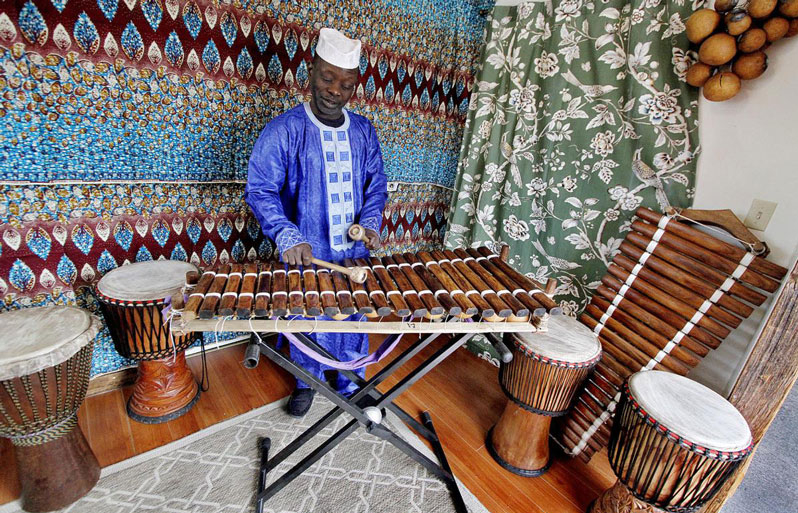NERON SIMPSON
Special to The Leader
While many people march to the beat of their own drum, African musician N’Camara Abou Sylla is carrying on the rhythms of tradition that his father passed down to him.
These traditions were brought to SUNY Fredonia when Sylla hosted an open balafon workshop in Mason Hall on Wednesday, Oct. 26. Sylla’s visit was made possible by the Carnahan Jackson Fund for the Humanities, and he is widely regarded as a “master musician.”
A balafon is a wooden xylophone that vibrates with sound when tapped. According to Firestone, it was created during the 12th century during the formation of the Mali empire in the southern African region. While it is mainly played by the Mandinka people in Guinea, and the Brikama people in The Gambia, its influence has spread throughout the west African region.
Traditionally, the instrument has been created with Bene wood and bamboo, and consists of 17 to 21 keys. Gourds, or calabash, are then tied underneath the instrument to amplify the sound.
During the workshop, Sylla taught students a few songs in the sacred and cultural art form.

Hailing from the west African country of Guinea, Sylla is a ‘Djeli.’ Djelis are oral storytellers in Western African cultures. They worship, sing and recite the history of the villages and cultures they come from. The balafon is an important instrument for this reason.
According to Access Gambia, the tuning process is related to the languages of each ethnic group, so instrumental sound variations between different tribal groups is highly common.
Traditionally, the teaching of the instrument is passed down from father to son. However, it is sometimes taught to daughters as well, but it is not as common despite women being allowed to play.
Sylla was very enthusiastic and passionate in his presentation. In such a small intimate setting, he was unafraid to correct anyone who was off-tune. He led with a pacing exercise in which one taps corresponding keys to make a beat.
Once the rhythm was established, Sylla played more advanced notes and began singing over the taps. He got up and went around to each student and played a few notes in conjunction with our tapping on the balafon. The music became louder, and the rhythms became faster.
The experience was intense, engaging and fun. It was a cerebral and spiritual exercise.
At the end of the workshop I asked Sylla a few questions about his life experiences and musical talent:
What made you want to become a musician?
Sylla: “I was born into it. My entire family have been musicians before I was born and my dad is a great balafon builder. I grew up seeing him doing it and he taught me.”
Can you describe your creative process when making new music with students?
S: “It comes to me. I get inspired from people and the little mistakes and I love to correct that. I might find a simple way for [students] to get into the feeling of the music I’m teaching. I have to make them have [motivation].”
How do you feel you have evolved since you first started playing until now?
S: “I feel wonderful and lovely. I have been playing for the past 55 years. My dad encouraged me and gave me my own balafon when I was 12. Since then, I’ve had to play. I hear and observe everything that’s going on.”
West African countries are often grouped together into a monolithic identity with little individual recognition. What are some aspects of Guinean culture you feel the world should be more aware of?
S: “I want people to learn about the djembe [drum]. Come to my country and see how they play the music. We are wealthy with diamonds, gold and bauxite. You can go online and look at the wealth and richness of *Guinea. There is only one Guinea. Not Guinea-Bissau, not Equatorial Guinea, but Guinea Conakry.”
*Guinea, Guinea-Bissau and Equatorial Guinea share similar names but they are different countries within west and central Africa. Conakry is the capital of Guinea.
